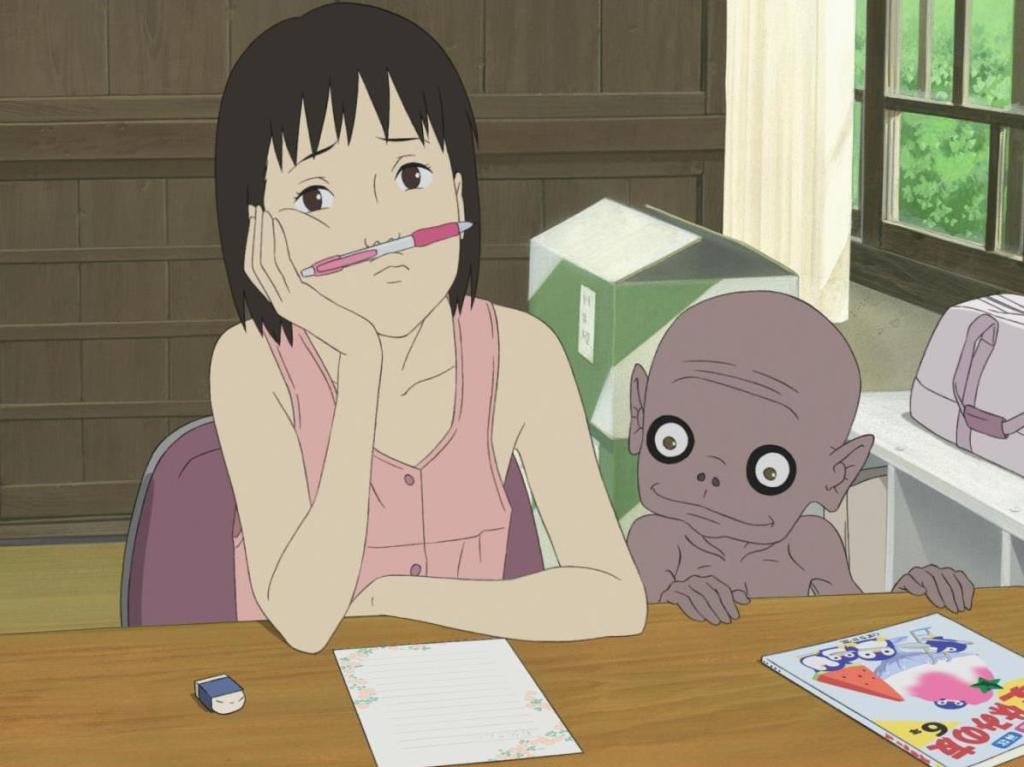The plight of a young protagonist, emotionally uprooted by tragedy and physically displaced by a move to a new locale, forms the basis of many family-oriented anime classics – and it is from this wellspring of material that A Letter to Momo (Momo e no tegami) emerges. The shadows of the film’s thematic predecessors are evident, recalling much of Studio Ghibli’s output; familiarity is also found in the creative, chaotic, magical and mysterious ways its strong-willed central character copes with the swift and sudden onset of transformation.
In only the second feature from animator turned writer/director Hiroyuki Okiura after 1999’s Jin-Roh: The Wolf Brigade, and one seven years in development, the titular communication and teenage girl prove pivotal. After her father’s passing, Momo (Karen Miyama, Saitama kazoku) becomes obsessed with an unfinished note, penned from him to her after their heated parting. Moving with her mother (singer Yuka, Strange Circus) to the remote island of Shio, her mourning is heightened, the distance between her old and new lives only growing. As an upset outsider unaccustomed to her surroundings, Momo finds solace in the silhouetted spirits that become her guiding force and unlikely friends.
Similar to most films of the same ilk, A Letter to Momo is a feature about maturity and reconciliation, the journey to both underscoring its bittersweet narrative. The adrift Momo must follow a path fraught with challenges to arrive at both eventualities, the serious and the not-so experienced along the way. For the former, Okiura is restrained and respectful in exploring the difficulties of grief, and the uncertainty that follows any loss. For the latter, the adorable anarchy tempers the gravity, as embodied by the newfound pals. Together, a thoughtful take on Shinto religion and spirituality arises, at all times contemplative and energetic.
As Momo’s feelings swell – first of adolescent confusion, then of increasing confidence – it is impossible not to be immersed in the affecting story, or the intricate beauty of the hand-drawn animation. Watercolour-like backgrounds provide a picturesque setting for the moving musings to play out; detailed, dynamic and diverse characters enjoy the scenic atmosphere, but are carefully, colourfully rendered in their own way. Well-matched voice acting completes the appealing combination.
Where the film threatens to stumble is in its structure and length, allowing an extended introduction to spend too long meandering before its meatier developments unfold. And yet, spending more time in this emotive, intelligent world is to be welcomed; though A Letter to Momo is slightly imbalanced in its tonal construction, and its content recognisable, the end result is always endearing and enjoyable.
Rating: 3 ½ stars out of 5
A Letter to Momo (Momo e no tegami)
Director: Hiroyuki Okiura
Japan, 2011, 120 mins
Distributor: Madman
Reel Anime 2013
www.reelanime.com
Adelaide: 26 Sept – 9 Oct
Avoca Beach: 3 – 16 Oct
Brisbane: 3 – 16 Oct
Canberra: 3 – 16 Oct
Hobart: 3 – 16 Oct
Melbourne: 3 – 16 Oct
Perth: 3 – 16 Oct
Sydney: 3 – 16 Oct
Actors:
Director:
Format:
Country:
Release:





